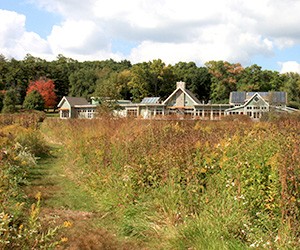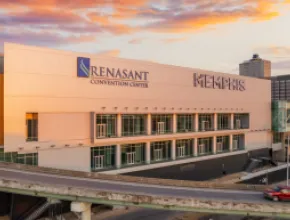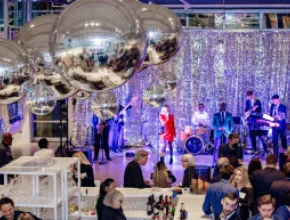Madison, Wis., is as passionate about sustainability as it is about beer, which is saying something, as the city of 240,000 people consistently ranks in the top 10 on nationwide “breweries per capita” lists. Madison has also long set the state standard for green buildings, locally sourced catering and outdoor public spaces. Occasionally, the two passions intersect, like at the new Wisconsin Brewing Company, which opened in the suburb of Verona in late 2013.
The craft brewery was designed with details meant to minimize waste and energy usage. Founded by three proud Wisconsin natives, the brewery offers several event spaces, including a 75-person taproom, an indoor tasting room and a large outdoor patio, plus customizable tours for groups.
The technologically advanced brewery is one of the latest iterations in Madison’s long history of sustainable creations, from beverages to buildings. The city’s venues reflect this dedication to the environment, offering LEED-certified conference centers, farm-to-table dining and CSR programs that give back to nature.
Sustainable practices are woven into the fabric of Madison, and the city has a long list of environmental pioneers like Aldo Leopold, an environmentalist and professor at the University of Wisconsin who helped create the modern concept of wildlife management. Leopold studied forestry at Yale, founded the Wilderness Society and advocated for the scientific preservation of wildlife by both public and private landowners.
Nowadays, Dane County is home to 6,000 acres of parkland, 150 miles of bike trails and more than 26,000 acres of local lakes. Madison itself has 260 parks and five lakes, with scenery and green spaces helping to inspire the dedication to sustainability.
Located just outside the city limits in Monona, the Aldo Leopold Nature Center is a beautiful off-site venue for conference groups, offering tours, interactive exhibits and guided hikes. It is a major draw for some planners, says Janine Wachter, director of convention and event services for the Greater Madison CVB, “It helps us bring in environmental groups.”
West of Madison, the Leopold Center’s Black Earth Campus offers overnight lodging, team-building exercises and naturalist programs perfect for green retreats.
Another environmentally friendly venue is the waterfront Monona Terrace Community and Convention Center, which just completed a renovation. One of Madison’s marquee conference facilities, Monona Terrace is a LEED Silver-certified building with a Travel Green Wisconsin Score of 92 points.PageBreak
According to Jeff Griffith, the building maintenance and technical supervisor, the property replaces its more than 50,000 square yards of carpeting every 10 years and tries to schedule other maintenance projects during the same time period to minimize closures. Monona Terrace reopened at the end of January with new carpeting, upgraded bathrooms, new LED lighting and updated acoustic ceilings. Many of the additions, such as water bottle filling stations, digital signage and low-flow toilets and plumbing fixtures will shrink the center’s carbon footprint.
“The filling stations will be great,” says Michelle Marx, the center’s event coordinator. “Planners are always asking for water bottles and no disposable cups.”
Monona Terrace is also adding a museum gallery highlighting the building’s 60-year history, including its Frank Lloyd Wright design, on the third floor, according to Marx.
In a clever repurposing of space, old payphone banks were converted to small working nooks where attendees can plug in their laptops or make private phone calls between meeting sessions.
Located two blocks from the Wisconsin State Capitol, Monona Terrace was designed by Wright, who was a Wisconsin native and began envisioning Madison’s “dream civic center” in 1938. Though the center has been modernized and its interior updated, architectural tours continue to showcase Wright’s vision and the resulting lake views and striking open spaces in the venue.
Current eco-initiatives include passive solar heating, green bulk purchasing practices and careful recycling of nearly half of the building’s solid waste. Monona Terrace also participates in the Leonardo Academy’s Cleaner and Greener Program, which was created in 2001 to offset emissions produced by group events.
Leonardo Academy is a local company that offers consulting services for meeting planners looking improve event sustainability. Taking group budgets into consideration, Leonardo Academy will help planners decrease carbon emissions and add composting and other programs to events. PageBreak
The Alliant Energy Center, another major conference venue, is popular with agricultural groups and proud of its farm-to-table catering program. Centerplate, a food and beverage provider, creates menus with more than half the items grown or raised in Wisconsin. During the 2013 World Dairy Exposition, the catering team served 8,000 meals a day, all locally sourced, using more than 2,000 pounds of Wisconsin artisanal cheese.
Another recommended green venue in Madison is the LEED-certified Madison Children’s Museum.
“It’s great for group off-sites,” Wachter says, “After-hours, there aren’t children around so adults can build replica models of Madison, play on the giant hamster wheel and create recycled art.”
Another LEED-certified venue is the Wisconsin Institute of Discovery at the University of Wisconsin-Madison. The main floor features a 40,000-square-foot town hall space for rentals, hosting up to 1,000 attendees. Scientists conduct sophisticated biomedical research on the center’s upper levels, while the grounds also house a Mesozoic garden and restaurant. Teaching labs can be reserved for demonstrations and workshops.
Lastly, Wachter recommends planners consider the Olbrich Botanical Gardens & Bolz Conservatory. With 16 acres of outdoor gardens, the conservatory is a serene excursion option. Besides tropical flowers, many of the plant species are “Midwest hardy,” with low water demands. Rainwater is collected and recycled, irrigation is computerized, and weeds are controlled without the use of damaging chemicals.
Programs include gardening classes, outdoor yoga, greenhouse tours and a “plants of the dinosaur age” conservatory walk, which shows off prehistoric ferns, palms and flowers. For year-round events, there are three indoor rooms that can be rented out, each with garden views.






